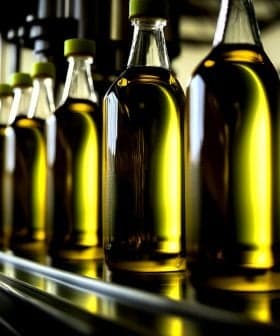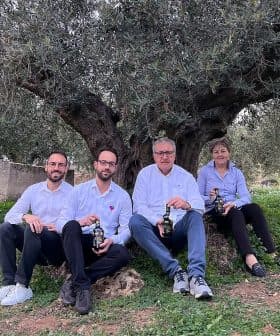In Italy, Reactions to the '60 Minutes' Report on Olive Oil from Anger to Resolve
The ’60 Minutes’ report on mafia involvement in Italian agriculture, particularly the olive oil sector, sparked a debate within the industry, with some condemning negative stereotypes perpetuated by the American press, while others saw it as an opportunity to highlight the efforts to combat agromafia and promote high-quality Italian products. Despite differing opinions, there was a consensus among producers, experts, and consumers on the need to address the issue of organized crime infiltration in the food industry by enhancing legislation, consumer awareness, and promoting quality products.
A report dedicated to mafia involvement in Italian agriculture, and especially the olive oil sector, by CBS News magazine ‘60 Minutes’ on January 3, naturally raised various reactions.
Taking a cue from recent scandals involving adulterated olive oil, CBS News correspondent Bill Whitaker suspected the threat of mafia entanglement throughout the whole “Made in Italy” industry, with an annual turnover estimated at $16 billion. The anchor’s words, “Mafia copies of fine olive oil, wine and cheese have fueled an explosion of food crime in Italy,” touched the heart of the Italian food sector.
See Also:60 Minutes: Agromafia
The delicate topic has been debated by specialized publications with, on one side, protests and objections, and on the other side a humble, proactive and determined approach, to enhance the excellent work of thousands of honest producers — more than 700,000 farms — proud to bring the quality of real “Made in Italy” in the world.
What is the point of helping the American press to use negative stereotypes of our country?
On OlioOfficina Magazine, a polemic letter by the president of the CEQ consortium, Elia Fiorillo, addressed to the minister of agriculture, Maurizio Martina, lamented the fallout of the ’60 Minutes’ segment. “Italian olive oil, knowingly targeted, emerges deeply discredited,” Fiorillo said, before asking the minister, “What is the point of helping the American press to use negative stereotypes of our country?”
Since the domestic production is in no way sufficient for internal consumption and a large part of Italian exports are made up of blends from different origins, according to Fiorillo the solution to save the economic and social interests, “is to safeguard both exported products” with unambiguous labeling, which harks back to an earlier CEQ proposal to institute an official recognition for “High Quality Italian EVOO.”
In a pointed indictment of the motives behind the ’60 Minutes’ exposé, Fiorillo called for an “urgent, official and authoritative initiative by the institutions of this country, able to disarm both those who legitimately have an interest to snatch our market portions and those who try to mask their historical inefficiencies with populist media operations.”
With a different tone, Alberto Grimelli wrote on the blog Teatro Naturale, that “Bill Whitaker has instead made a good service.”
“What emerges from the transmission is that Italy, despite the agromafia, is still present in the national agri-food system, is a country with the antibodies, both in control systems and in civil society, to combat this scourge.”
“Bill Whitaker could certainly be much harder with Italy,” he wrote, “but fortunately for us he obviously loves Italy and good Italian food.” He was impressed that Whitaker called olive oil “the food of God” and said it was no coincidence that featured the mill of Nicola Clemenza, portrayed as a hero of the civil society having organized a group of Sicilian producers to fight against the mafia, despite having suffered serious intimidations.
The on-air joke that the NAS were like the “FBI of food” was effective, at least to show the implementation of controls, and Grimelli reminded readers that only a few days before ‘60 Minutes,’ the ministers of agriculture and justice introduced a bill with new rules to combat illegal hiring that is a notorious tactic of organized crime.
He said he hoped the program was seen “by members of the Agriculture and Justice Committees of the Chamber of Deputies, called to express their views on draft legislative decree that would decriminalize certain offenses relating to the labeling of olive oils, which can be indication of more serious offenses.”
Mafia Control of Olive Oil the Topic of ’60 Minutes’ Report: interesting, but not all Italian olive oil is like this https://t.co/ZigWjojjmy
— Antonio Brunori (@AntonioBrunori) January 8, 2016
Taking a look at social networks, chaotic but revealing tank of people’s feelings, some groups of users linked with the olive oil industry exhibited disappointment and vibrant protests against the allegations that seemed like mudslinging the entire Italian olive oil production. But there were also calls for a more efficient promotion of high-quality products, which has nothing to do with the mass-production that comes across the agromafia path.
Among producers, technicians, experts and tasters, a similar and homogeneous feeling emerged: a healthy and honest desire to fight the problems of counterfeiting by organized crime infiltration which, someone pointed out, is not only an Italian issue, by enhancing the legislative instruments, consumer awareness and the promotion of quality food.
A Tuscan producer said: “A solution can be to strengthen the distinction between commercial products — which of course are generally more exposed to the threat of counterfeiting — and the high-quality olive oils, that — and this must be the good news — represent the very large part of Italian production.”









